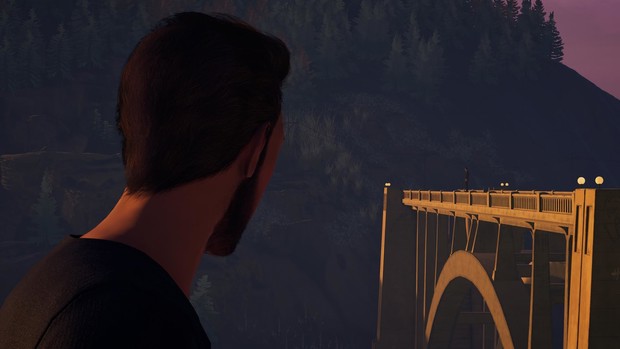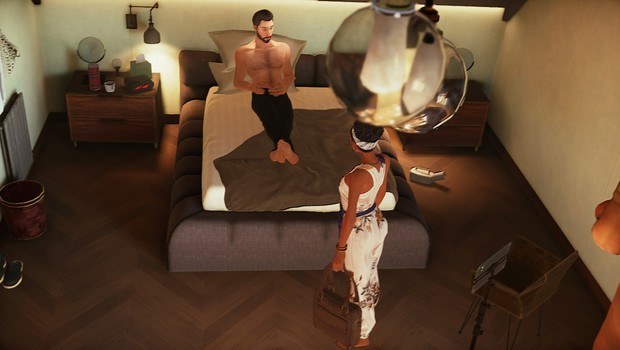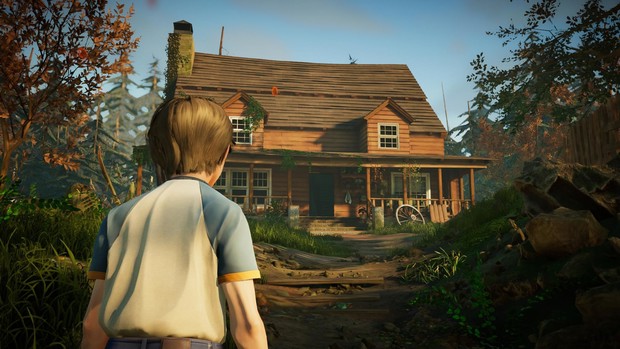Alfred Hitchcock: Vertigo review

- 1 Comment
Suspenseful thriller a dizzying array of compelling plot twists
Spielberg. Scorcese. Kubrick. Coppola. No list of legendary motion picture directors of the twentieth century could be complete without Alfred Hitchcock. He is widely accepted as a master of his craft, with a body of work that spans decades and is still studied by fledgling filmmakers across the world to this day, nearly half a century after his death. To attach his name to any product is to imply a certain kind of unimpeachable acclaim, so when Pendulo Studios and Microids announced their own interactive take on Vertigo, anticipation skyrocketed exponentially. While clearing that bar may have been next to impossible, the game is still a solid and interesting piece of interactive fiction on its own merits, focused more on telling an intriguing mystery than on engaging gameplay or challenging puzzles.
Let’s address the elephant in the room right off the bat: this Vertigo is not a modernized retelling of Hitchcock’s classic 1958 thriller of the same name. Rather, it draws inspiration from the film, as well as from other Hitchcock pictures, more in terms of mood and cinematic aesthetic but occasionally even on a narrative level. I was needlessly worried that the game would spoil the movie for me, or that being unfamiliar with the latter would dampen my experience with the former. Meanwhile, fans of the motion picture will be able to fully enjoy the game but should adjust their expectations accordingly, as there’s no sign of James Stewart or Kim Novak anywhere to be found here.
The game centers around Ed Miller, a writer who awakens on the side of the road after his car has just plunged into a deep ravine. Ed is traumatized by the deaths of his girlfriend Faye and their daughter, both of whom he claims were in the vehicle, despite the fact that no bodies were found and no official records exist of either one. Confined to his home by a sudden onset of vertigo that leaves him unable to even walk, Ed is placed in the care of Julia Lomas, a therapist who attempts to dig into his subconscious to get to the truth behind the whole affair.
For the lion’s share of its ten-hour runtime, Vertigo plays out as an interactive movie. Though players are often given direct control of one of several characters, performing timed button presses (a la Heavy Rain) and navigating via the gamepad (the game’s stated preferred control method) or keyboard, it’s usually just to advance to the next story point or narrative cinematic. The same is true for the majority of dialog choices, which generally seem to exist to give you the ability to gently shape people’s attitudes rather than influence the plot wholesale. Vertigo can perhaps best be compared to Don’t Nod’s acclaimed Life Is Strange series, the experience focused on immersing yourself in your new surroundings, taking the time to wander the 3D environments and interacting with items to hear your protagonists’ inner thoughts.

Like Life Is Strange, this game is also far more concerned with providing a character-driven experience than on shoehorning puzzles into it. As a result, Vertigo includes hardly anything that could truly be called a puzzle, and the few that are included make no effort to move the needle in any appreciable way. To give each character a purpose to explore, there’s often some sort of objective to locate one item or another, but it’s never anything complicated. To put this into perspective, one of the more involved objectives takes the form of having to put away groceries (literally emptying a shopping bag one item at a time and finding the best place to store it in the kitchen or adjacent pantry) while another optional “puzzle” sees you feed and water a horse by turning on a faucet and picking up a couple of carrots, both of which are right next to the animal. It's more pedestrian than cerebral, with storytelling clearly taking precedence over problem-solving.
The tale is told from several points of view, including both Ed and his therapist Julia. Another major protagonist is Sherriff Nick Reyes, the local beat cop who is in charge of investigating Ed’s crashed vehicle and the enigmatic missing daughter and girlfriend. It doesn’t take long to find your footing in this world and its characters, and the interplay between them, as well as the relationships they build, becomes quite engrossing. There are several supporting characters, most having one or more moments to pique interest in their role in the grander scheme of things, and as the narrative yarn is spun, there are a few surprising revelations lying in store. I was pretty sure I had cracked the case well ahead of the final reveal but was pleasantly surprised to find there was much more to the whole mystery than I had anticipated, even if the final act isn’t as snappily paced as it perhaps could (or should) have been.
Ed acts as the throughline connecting the game’s multiple timelines, including the way the present investigation dovetails with some earlier events in his childhood. Each of the five main chapters sees Ed and Julia sit together for a therapy session, hoping to shine some light on the truth, though this framework is cast aside during the final stretch in favor of ratcheting up the excitement. Each therapy session sees Ed recounting a pertinent event from his past, after which Julia puts him under hypnosis to delve even deeper.
This is a clever plot device that lets you view each of these pivotal events through a new lens. Initially we see everything the way Ed remembers it: safe, sanitized, proverbial Kodak moments glimpsed in the family photo album. Then, once the hypnosis has taken effect, a darker side is revealed, free of Ed’s subconscious manipulation of events to cast them in a more harmless light. A chance romantic encounter becomes a sinister web of deception, and boyhood games of spies and pirates become ways to deal with living in a broken home.

Players are able to fast-forward through the memory sequences to get to key moments in which a darker truth is slowly exposed, which is an interesting way to deal with replaying previously viewed events. As Ed is forced to come to terms with the delusions he’s lived with most of his life, the game’s tone becomes progressively darker. Alcoholism, psychological terror, grief, suicide, and murder accompany our cast of characters along their journey. Even so, if you steer certain character interactions correctly, there is also a chance to sow the seeds of a budding relationship before the credits roll.
True to Vertigo’s cinematic pedigree, a lot of effort was poured into the game’s production value. The classical score often sounds like something I’d expect to hear in a Hitchcock film, and at times made it seem like I was sitting in a theater watching a picture show with the orchestra in the pit in front of the stage. However, musical variety is a little lacking, as some themes are used too repetitively. Voice acting is top-notch nearly across the board, with the common exception of an unconvincing child actor, as well as a few moments when the dialog falls noticeably out of sync with the animation.
The game is a feast for the eyes, too. Taking place in California’s scenic mountain ranges, with their lakes and canyons, Vertigo frequently hops from one gorgeous locale to another. An early scene with Julia makes a meal out of relaxing by a serene lake, skipping stones across its glassy surface and taking in its quiet tranquility. There’s a small-town sense baked in, despite the fact that we never actually get to see the town, and all told only visit a handful of locations. You will spend a good bit of time in and around Ed’s house, and seeing it change in design and layout over the course of different stages of his life is interesting.
Indoor spaces are no less striking, luxuriously detailed and designed in ways that really show off the interesting architectural spaces dreamed up by the designers. A notable example comes early on when the sheriff enters a nearby farmhouse in search of its missing owners. It’s delightful how the natural tension of the scene – the sheriff slowly stalking through the home, gun at the ready, methodically checking each room and expecting to surprise an intruder at any moment – is almost undercut by how meticulously “lived in” the place feels. I was supposed to be on the edge of my seat (and I was, truth be told), but I couldn’t help but stop and gawk in wonderment at the sheer level of detail evident in the decorations and knick-knacks on display, each one seemingly placed there by the home’s inhabitant. I can now proudly say that I’ve spent time in an in-game bathroom actually admiring its design, with a toilet-side magazine rack and wall hangings with rustic sayings like “Don’t forget to flush.”
The only blemishes marring an otherwise solid visual presentation are the harsh character models. It’s hard to put a definitive finger on, but everyone looks a little on the pugnacious side, with not a single pretty face among them. I quite liked this look for older characters such as Nick and Julia, who even benefit from the added character it lends their appearances, but other cast members don’t fare as favorably and made it actually harder for me to root for some of them. We’ve seen Pendulo Studios pull of good-looking character models in the past, so these designs honestly left me a little nonplussed. (On the plus side, there’s a fun Easter Egg for eagle-eyed players early on, when the famed director makes one of his iconic cameo appearances in the game!)
Final Verdict
Despite a few hiccups and surprisingly little connection with its Hitchcock classic namesake, Vertigo is a well-told and interesting narrative experience, particularly for those who enjoy a gripping mystery in the style of the old masters. It’s an easy recommendation for story lovers, although those who play adventures for their puzzle elements need to be aware that this game offers a superficial experience at best. But with its generally high production values, an interesting twist on the “memory sequence” gameplay mechanic, and a narrative that even offers a few memorable twists along the way, all others will find plenty here to like.
Hot take
Although only very loosely connected to Hitchcock’s thriller, Vertigo is a solid entry in the puzzle-lite interactive fiction category that adheres nicely to the style of the Master of Suspense himself.
Pros
- A mature tale inspired by a giant of 20th century film
- Surprise reveals and a unique memory mechanic keep the story flow engaging
- Gorgeous environments; voice work and music that seem to transport you to an evening at the theater
Cons
- About as devoid of puzzles as you can get
- Character models are so stylized as to actually be off-putting; final act loses a bit of pacing
Pascal played Alfred Hitchcock – Vertigo on PC using a review code provided by the game's publisher.










1 Comment
Want to join the discussion? Leave a comment as guest, sign in or register in our forums.
Great review. As a huge AH fan I was excited for this game. I still am. The lack of puzzles is off putting for my style of adventuring but it sounds worthy of a playthrough. - Joshua
Reply
Leave a comment